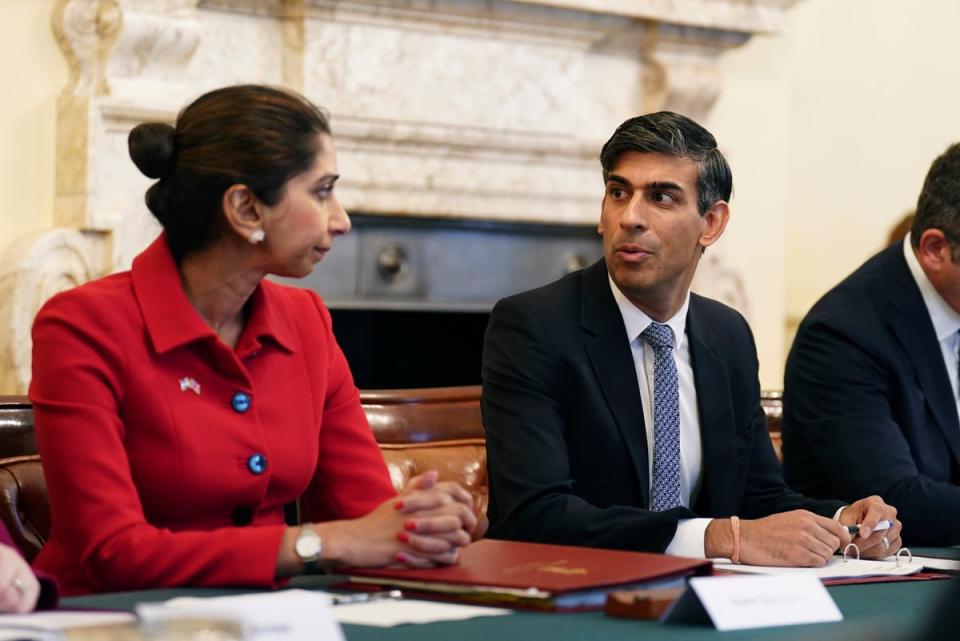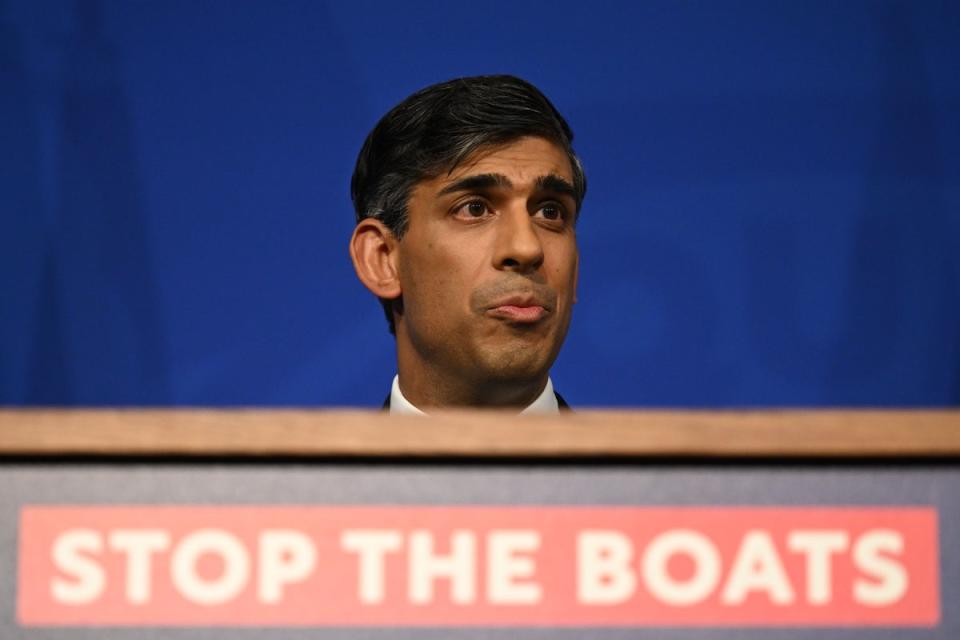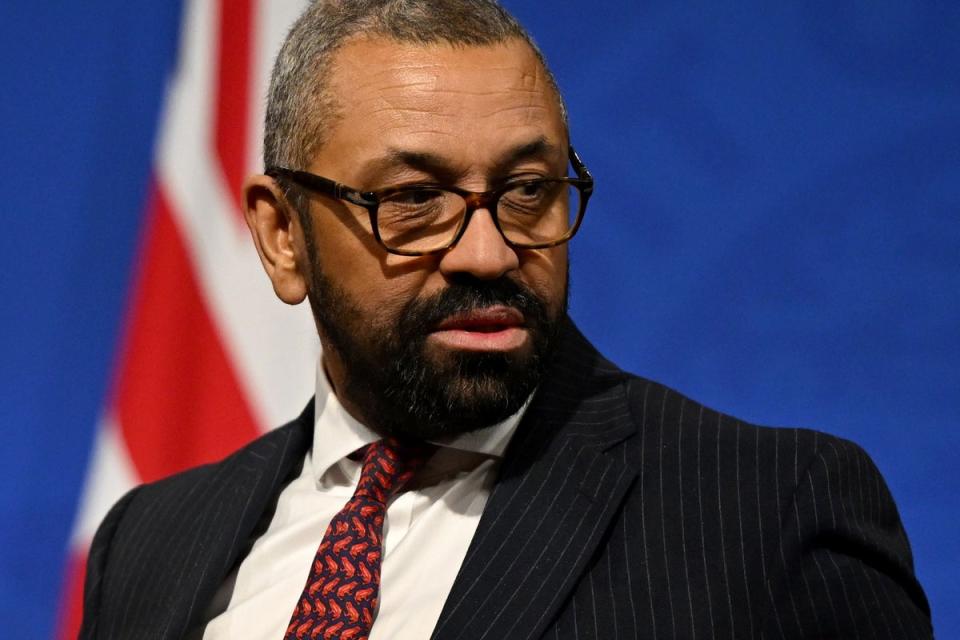How low can you go, Mr Sunak? PM tries immigration crackdown as his popularity plummets
Rishi Sunak’s government has unveiled a crackdown on record-high net migration as he tries to wrest back control of his increasingly divided Conservative Party.
The measures, unveiled by home secretary James Cleverly, follow a series of polls which show the Tory leader’s popularity has plummeted to a record low and he is now faring even worse than Liz Truss with the electorate.
The latest ConservativeHome survey revealed Mr Sunak’s support among Tory grassroots plunged to -25 per cent, making him the least popular member of the cabinet.
In a bid to win back voters, Mr Cleverly increased the salary threshold for foreign workers from £26,200 to £38,700 as part of a package set to come into force in April.
Mr Cleverly also raised the threshold for people living here wanting to sponsor a family member to move to the UK – the person living in the UK must now earn £38,700, up from £18,600 currently.
He also banned overseas social care staff from bringing dependants to the UK and the rule allowing the most-needed professions to be hired at 20 per cent below the going rate would also be scrapped.
MPs on the Tory right urged the PM to implement even more severe measures to control numbers and ignore human rights law so Rwanda deportations can begin – warning that “nothing matters more” to voters than immigration.
But business leaders warned of major staffing crises in hospitality and social care ahead. Labour accused the Tories of “chaotic panic”, while union leaders claimed the PM was “playing roulette with essential services” to placate the right.
The fresh row came as Mr Cleverly announced:
A five-point plan to cut legal migration and a new target of 300,000 fewer migrants a year
Foreign care workers will no longer be able to bring their dependants to the UK
The minimum income for family visas was raised to the new salary threshold of £38,700
The shortage occupation list will be overhauled to end a 20 per cent salary discount
The graduate visa route – letting students stay for two years after their studies – is under review
Mr Cleverly declared “enough is enough” as he promised his plans would deliver “the biggest ever reduction in net migration” after levels soared to a record high of 745,000 in 2022 and sparked Tory outrage. He said the strategy would bring down annual levels by 300,000 in future years.
Mr Cleverly said the Tories would get rid of “cut-price” labour by stopping shortage occupations being able to pay 20 per cent less than the going rate, and restricting the number of jobs which are on the list.

Sacked home secretary Suella Braverman said the measures were “too late and the government can go further”. She called on Mr Sunak to cut the graduate visa route from two years, and bring in an overall “Australia-style” cap on annual net migration.
Mr Sunak and Mr Cleverly did not limit the total number of NHS and social care visas – a move immigration minister Robert Jenrick is believed to have been pushing for. Two sources said Ms Braverman and Mr Jenrick had also pushed for the salary threshold to go even higher – to £45,000.
Senior Tory John Hayes, Ms Braverman’s closest ally, told The Independent that “nothing matters more” than the immigration crackdown – both legal and illegal – if the party has any chance of winning next year’s general election.
Mr Hayes, leader of the Common Sense Group, said the new moves were “long overdue but incredibly welcome”, although he warned that Mr Sunak he would have to go further.
Mr Hayes is demanding that the Tory leader opt out of the European Convention on Human Rights (ECHR) in its emergency Rwanda legislation. “We need severe measures. We need to be really tough,” he said.
Leading right-winger Simon Clarke, a former cabinet minister, claimed Tory voters had expressed a “desperation for bold action to deliver a fix”. The ex-minister said voters “will return if we deliver on illegal immigration”.
Sir Jacob Rees-Mogg challenged Mr Cleverly in the Commons to consider Ms Braverman’s idea of an “Australia-style” overall cap on net migration numbers. But the new home secretary said a cap would be “difficult” to manage.
Record-high migration has reopened the huge divides in the Tory party. Mr Jenrick said last week that he wanted to bring in his own plan “before last Christmas”, and suggested he was keen to consider an overall cap on net migration.

However, senior Tory Damian Green warned Mr Sunak and Mr Cleverly about the “huge shortage in the care sector”, warning that the ban on dependants could cause major problems.
The One Nation group leader said: “I would hope that this isn’t a significant contributor to the reduction in numbers, because if it is, it will cause damage to the care sector.” But Mr Cleverly denied that it would lead to a staff shortage.
Tory health committee chair Steve Brine has also warned against clamping down on care workers, arguing that they are “the people who look after your ailing parents and grandparents”.
Unison general secretary Christina McAnea accused Mr Sunak of “playing roulette with essential services just to placate its backbenchers and the far right”. She warned that some foreign workers already here will now leave.
“What do you think’s going to happen?” she told the BBC World at One programme. “To those who are already here, who do have dependents when they come to renew their visa, presumably they will be told you have to send your children back again.”
Prof Martin Green, chief executive of Care England, said immigration was “saving the social care sector” from collapse – arguing that 70,000 overseas workers were needed in the past year to fill gaps.
The Royal College of Nursing (RCN) said Mr Sunak “appears comfortable with tearing apart families to score political points”. And Miriam Deakin, director of policy at NHS Providers, said measures that deter foreign recruits were “deeply concerning”.

UKHospitality chief Kate Nicholls warned of a major staffing crisis in pubs, bars and restaurants – arguing the changes “will further shrink the talent pool” and “worsen the shortages hospitality businesses are facing”.
The industry leader warned that 95 per cent of the 8,500 hospitality visas issued last year would no longer be eligible under these plans.
Dr Madeleine Sumption, director of the Migration Observatory, said the move to raise the family visa income threshold to £38,700 would restrict some people “very significantly”.
She said the largest impact “will fall on lower-income citizens, and particularly women and younger people”. Reunite Familes UK, which helps migrants bring loved ones to Britain, said they were “beyond devastated” at the change.
It comes as a new JL Partners survey found that just 59 per cent of people who voted for the Tories in 2019 plan to vote Conservative at the next general election, down from 63 per cent following Ms Truss’s disastrous mini-Budget. It also revealed that one in six 2019 Tory voters have switched to Reform UK.
Separately, a BMG Research survey shows that Reform UK is now third on 11 per cent – its best performance in any poll by the firm. Pollster James Johnson said there was “only one option for the Conservatives now: go big on immigration or go home”.
Labour’s shadow home secretary Yvette Cooper said Mr Sunak’s “chaotic panic” plan was “an admission of years of total failure by this Conservative government”.
Alistair Carmichael, the Lib Democrats’ home affairs spokesperson, said polling showed that confidence in Mr Sunak’s approach to immigration was “at an all-time low – yet they seem determined to keep pushing their damaging, divisive policies”.
The major overhaul comes as Mr Cleverly is in Rwanda to sign an updated agreement. But senior civil servants at the Home Office are said to have warned No 10 that its Rwanda legislation is destined to fail.

Government lawyers are reportedly refusing to sanction the most draconian version of the legislation that would opt out of the ECHR by using a “notwithstanding” clause to direct UK judges to ignore it.
Leading Tory moderate Sir Robert Buckland warned that opting out of the ECHR would be “foolish and rash” and would endanger the Good Friday Agreement. The new chair of the Northern Ireland affairs committee told the BBC it would be “a very un-Conservative step”.
But senior Tory Mark Francois warned Mr Sunak that it could be “three strikes and you’re out” – urging the PM to to ignore the ECHR in the emergency Rwanda legislation.
The chair of the European Research Group (ERG) told GB News: “Rishi promised to stop the boats but ... he hasn’t has he? … We’ve had two goes before. Now it’s three strikes and you’re out”.

 Yahoo News
Yahoo News 
